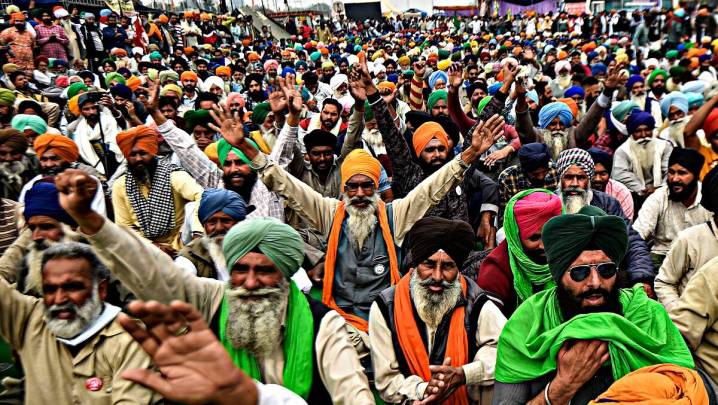 Since the SKM had distanced itself from any kind of engagement with the SCC, the latter interacted only with farm unions that were either supporting the laws or wanted minor amendments. PTI
Since the SKM had distanced itself from any kind of engagement with the SCC, the latter interacted only with farm unions that were either supporting the laws or wanted minor amendments. PTI India’s apex court, despite repeated requests from the Supreme Court Committee (SCC) on the contentious farm laws, did not make the latter’s report public. This led committee member Anil Ghanwat to release the report earlier this month. This SCC was constituted when the farmers’ protest was at its peak. The Samyukta Kisan Morcha (SKM) — an umbrella body of the protesting farm unions — had feared that the SCC could be an attempt to dilute the protest.
Some SCC members had already made comments in favour of the farm laws. They continued to remain vocal in their support and discredited the farmers’ protests even while the committee was functioning. The report, in effect, is in line with those opinions as it suggested that the farm laws should not be repealed. It also recommended the government should not be concerned about the Minimum Support Price (MSP).
Since the SKM had distanced itself from any kind of engagement with the SCC, the latter interacted only with farm unions that were either supporting the laws or wanted minor amendments. The committee gathered feedback on its portal and via email after a public announcement — this included a majority of non-farmers — and finally included the opinion of its members as “evidence-based analysis”.
While analysing the responses, the SSC concluded that around 85.7 per cent of farmers’ organisations are happy with the farm laws. The SSC report itself says it sent an invitation to 266 farmers’ organisations, and only 73 responded to it, and 61 of these supported the laws. The fact is that more than 371 protesting farmers’ organisations, led by the SKM, had boycotted this committee. This committee did not try to meet protesting farmers at any of the protest sites whereas, in the case of the Shaheen Bagh protest, the then Supreme Court-appointed committee members made multiple visits to protest sites. The SCC met only the farm unions that did not have any grievances. In the report’s annexures, the committee has given details of the people engaged but it does not mention the names of the farm unions, or the leaders involved.
The committee did not reveal who it interacted with within Punjab, which has one of the finest APMC systems and procures much of its agricultural produce at MSP. Surprisingly, APMC boards and private markets of at least 10 states were engaged in the committee whereas the APMC board of Punjab was kept out. This shows the committee did not want to include the merits of MSP and APMCs in the report.
The SCC received 19,027 responses to its online questionnaire. Who are these respondents? Is this category of farmers a homogeneous group or was there any variation in landholding size, access to markets, cropping pattern, stratification based on caste, gender and age or in terms of so-called “rich or poor” farmers? Also, the reports stated that only 5,451 of these respondents were farmers and the remaining 12,496 were non-farmers. The committee does not specify who these other stakeholders are. Were agricultural labourers, agricultural labour unions and their leaders engaged by this committee?
The SCC claims to have received 1,520 emails. Again, who were the respondents? Had the committee issued any particular draft in which email suggestions were sought? Finally, in the name of “evidence-based analysis”, these members have put their own opinions in this important report. The task of this committee was “listening to the grievances of the farmers relating to the farm laws and the views of the government and make recommendations”. This was not done.
If not joining the committee’s processes on the farm laws is wrong, then how correct is it to release a sealed report in the public domain, that too months after the repeal of the laws? Why this eagerness in releasing the report when the Supreme Court itself didn’t make it public? It is worth mentioning another committee, which was accepted by the farmers and the SKM. This is the committee on MSP and other agriculture issues promised by the Government of India in its agreement with the SKM to end the protest on December 9, 2021. In over three months, there have been no developments in this regard. The sad culture of “committees” continues even in “Amrit Kal” and “New India”.
The writer is a PhD scholar at Jawaharlal Nehru University, and is associated with the Samyukta Kisan Morcha
- The Indian Express website has been rated GREEN for its credibility and trustworthiness by Newsguard, a global service that rates news sources for their journalistic standards.

